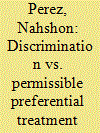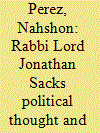| Srl | Item |
| 1 |
ID:
103234


|
|
|
|
|
| Publication |
2011.
|
| Summary/Abstract |
This essay analyzes the allocation policies enacted by Haifa University over its dormitories. While seemingly a trivial case, it is actually a key example of an ongoing legal and social struggle between Arab and Jewish citizens of Israel. The policy provides preferential treatment for veterans of IDF and national service. Adalah challenged this policy in an Israeli court which accepted the petition. However, the legislation was later changed to allow such preferential treatment. This article examines two issues: national service for Arabs, and the preferential treatment practised by Haifa University I will argue that both opening national service for Arabs, and the policy of Haifa University are justified, however, the analysis will demonstrate the complexity of both subjects, and the article concludes with suggestions for both issues.
|
|
|
|
|
|
|
|
|
|
|
|
|
|
|
|
| 2 |
ID:
191000


|
|
|
|
|
| Summary/Abstract |
An internationally renowned scholar and theologian, Rabbi Lord Jonathan Sacks (1948–2020), longstanding Chief Rabbi of the United Hebrew Congregations of the Commonwealth (1991–2013), suggested a direct discussion of the State of Israel. By way of exploring the way he viewed the modern State of Israel, this article discusses Rabbi Sacks’ overall communitarian, covenant based ideas before focusing on three categories: national narrative, the invigoration of civil society, and the place of religion. His most distinct criticism relates to the interrelationship between religion, the political system, and the state, illustrated inter alia by his insistence that ‘Judaism must be depoliticised and put back where it belongs, in civil society, far removed from all structures of power’.
|
|
|
|
|
|
|
|
|
|
|
|
|
|
|
|